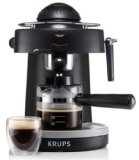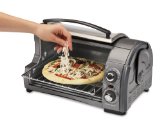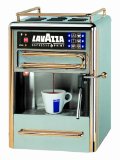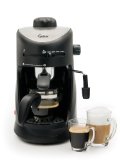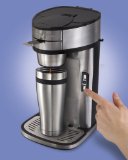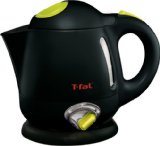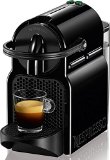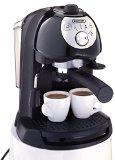Fast and convenient, the AeroPress Coffee and Espresso Maker makes one of the best cups of coffee you’ll ever taste. This innovative uses the ideal water temperature and gentle air pressure brewing to produce coffee and espresso that has rich flavor with lower acidity and without bitterness. It makes 1 to 4 cups of coffee or espresso (enough for 1 or 2 mugs), features a micro filtered for grit free coffee, and takes just 1 minute to make coffee (actualpress time takes only 20 seconds).

With total immersion brewing, the AeroPress produces uniform extraction for the ultimate in full coffee flavor. |
 |
 |
To brew a double espresso or 10-ounce cup of coffee:
- Place a microfilter in the bottom cap of the AeroPress chamber and twist the cap tightly closed.
- Place two scoops of ground coffee from the included AeroPress scoop into the chamber.
- Stand the chamber on a sturdy mug, then proceed to pour hot water into the top of the chamber (175 degrees F is optimal).
- Stir the water and coffee with the included paddle for about 10 seconds.
- Insert the plunger into the chamber and gently press down about a quarter of an inch and continue to maintain that pressure for 20 to 30 seconds (gentle pressure is the key to easy AeroPressing).
This will result in a double espresso. To make an Americano, simply top off the mug with hot water, or add hot milk for a creamy latte. The AeroPress can press from 1 to 4 scoops, and each scoop from the included AeroPress scoop makes the equivalent of a single espresso or 5 ounces of American coffee. Fill the chamber with hot water to the number corresponding to the number of scoops.
You can also make a full carafe of coffee using the AeroPress in less time than it takes to brew a pot of drip coffee. Two 3-scoop or 4-scoop pressing, topped off with hot water, will fill most vacuum carafes.
The AeroPress is the result of several years of applied research by inventor/engineer Alan Adler, who conducted numerous brewing experiments, measuring the brew with laboratory instruments. The experiments demonstrated that proper temperature, total immersion and rapid filtering were key to flavor excellence. He then designed and tested dozens of brewers before settling on the AeroPress design. Adler’s best-known invention is the Aerobie flying ring which set the Guinness World record for the world’s farthest throw (1,333 feet).
Comparison of Brewing Methods
Drip Brewing
Traditional drip brewing passes water through a bed of grounds. When the water first drips into the bed, it is too hot and bitterness is extracted. As the water filters downward through the bed, it becomes too cool and extraction is weak. The water doesn’t contact all of the grounds uniformly. Grounds at the edge of the bed are under-extracted, while grounds at the center are over- extracted and contribute bitterness.
Total immersion of the grounds in the AeroPress completely solves these problems. All of the grounds contact the same water temperature, and the brewing process is short and sweet. The gentle air pressure of the AeroPress also extracts extra flavor from the coffee. Ordinary drip brewers leave a lot of flavor in their soggy grounds.
The drip method cannot make a robust single cup because the small amount of water doesn’t heat the bed enough for rich extraction. It is also slow. AeroPress makes one to four servings with a single pressing in less than a minute. The flavor is equally rich for any number of cups.
Espresso Machines
Most coffee lovers agree that espresso is less bitter than drip brew because of the shorter brewing time. However when we ran comparison taste-tests in the homes of espresso lovers, they all agreed that AeroPress espresso tasted better than the brew from their high-priced European espresso machines–why? The reason is that the total immersion brewing of the AeroPress yields a robust flavor at lower temperature–and lower temperature brew is far less bitter. Home espresso machines don’t allow adjustment of temperature. But even if they did, their lack of total immersion would not yield robust flavor at reduced temperature. In addition to smoother taste, the AeroPress has several other advantages over conventional espresso machines.
- Grind is not critical in the AeroPress. Grind is so critical in espresso machines that most grinders cannot produce a grind fine enough to make a good tasting shot! Special espresso grinders cost hundreds of dollars and require frequent cleaning.
- Espresso experts always adjust the grind when there are changes in humidity or batches of coffee. They throw away two or three shots while adjusting the grind in to achieve the desired 25-second shot.
- There is no tamping in the AeroPress. Books on espresso teach the art of just the right amount of tamping. They instruct the home barista to practice on the bathroom scale to learn exactly thirty pounds of pressure.
- There is no pre-warming of the portafilter head. In fact the AeroPress has no portafilter head!
- There is no maintenance. Espresso machines require regular cleaning and descaling with caustic chemicals. They also require disassembly and cleaning of the showerhead.
- There is no need to judge when to stop the pull. This is the most critical skill in using an espresso machine. As espresso lovers well know, most would-be baristas in coffee shops, hotels and restaurants run the pump too long–extracting sour bitterness from the grounds.
- With the AeroPress, the amount of water is predetermined by the user, who can brew any strength from weak to super-intense just by choosing the desired amount of water prior to pressing.
Pod Brewers
Many single-cup pod brewers have come to market recently. Some of these machines make American coffee. Others make espresso. They range in price from about $60 to several hundred dollars. A highly respected product review magazine tested the three most popular pod brewers and reported the flavor as “mediocre at best.”
French Presses
People see some similarities between the AeroPress and a French Press. Both use total immersion and pressure. But the similarities end there.
The filter in the French Press is at the top of the mixture. Because coffee floats, the floating grounds clog the filter and makes pressing and cleaning very difficult. Users are instructed to use only coarse ground coffee. But this reduces the amount of flavor that can be extracted from the coffee and necessitates long steeping times which extract bitterness.
Furthermore, even coarse ground coffee includes many fine particles. These small particles pass through and around the filter resulting in a bitter, gritty brew. The particles in the brew continue to leach out bitterness. Consequently French press users are advised to drink or decant the brew immediately. Also, some particles clog the filter screen making pressing and cleaning very difficult.
AeroPress coffee is micro-filtered. It so pure and particle-free that it can be stored for days as a concentrate. The concentrate can be drunk as espresso, mixed with milk for lattes, or diluted to make American coffee. French presses cannot make espresso or lattes. Finally, cleaning the French press is quite a chore. The AeroPress chamber is self-cleaning. A ten-second rinse of the plunger is all that’s required.


